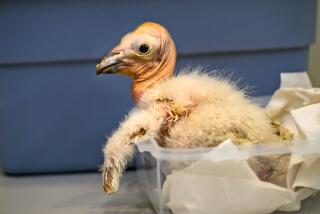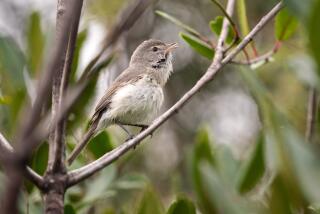A Condor Chick Is Hatched, and Hope Is Born, Too
- Share via
The chain saw rips through the oriole’s nest, through the tiny white egg, through the palm frond from which the nest was made, from which it was hung, carefully stitched there by the miracle of genetic memory, if not by something even more mysterious that we have come to label love .
The tree maintenance men move on, oblivious and indifferent to the side effects of their cosmetic surgery. The nest, Challenger-like, plummets to earth in gossamer shreds; the ripped-open egg, the body of its wet, homely, unborn chick that was on the verge of birth is pawed over curiously by the neighbor’s cat.
“The opposite of love,” said George Bernard Shaw, “is not hate--the opposite of love is indifference.” The tree trimmers did not take satisfaction from the chain-saw massacre of the oriole as lab technicians have with the brutalization of primate research subjects, or as tuna-seiner crews have with baby dolphins caught in their nets.
But this quality of mercilessness is not universal. There are a few holdouts, working at this moment to liberate an oriole sister/brother and the minds of us all. A few miles north of where I have just witnessed the oriole tragedy, a peak experience that all of us are sharing is being created by sheer force of will. Through total concentration and cooperation, a group of ordinary people have done an extraordinary thing--they have carefully nurtured a bird egg to a successful hatching. At the San Diego Wild Animal Park they have accomplished a first: They have demonstrated that their controversial theories were correct, that California condors will breed viable eggs in captivity that can be hatched into healthy replacements for their slain antecedents.
“Ridiculous!” shout narrow minds. “Why waste time and money to save a bird?” This is no ordinary bird, of course, but one of the last few California condors. Still the narrow minds carp, “The California condor is extinct anyway, so spend the money someplace where it will do more good.”
Money? MONEY? MONEY ! The sleaze blow more money in a minute than this program has cost over the last several years. One obscenely wealthy playboy blows more on one plaything, and collectively we spend trillions on transitory trinkets and every second go into record debt for more than this true miracle ever will cost.
But we get far, far more “for the money” than the homely baby condor that popped out of its space capsule on April 29. We get, if we can enumerate the values of a miracle, not just this helpless little naked bird called Molloko (the northern Maidu people’s name for condor) but also the potential for us all to soar free again.
As this chick opens its eyes to its future and the future of its species, we can open our eyes and minds to the fate of our own. A few of us have persisted in the face of opposition and have chosen life. We can now see that the importance of the individual is its promise for the species and for life. In one birth, in each birth, lies the fate of each species, of all species, of all life.
Individuals do die, but they truly are reborn with each birth, as a small bit of each came from each, and is passed to each. The miracle called Molloko not only shows us that we can help hatch an egg; it also shows us that an act of will and courage can help to turn a species back from a plummet toward oblivion.
Even more, it demonstrates a crucial distinction: Losing streaks by Orioles or orioles, stock-market crashes, planes blowing their tops all can in some sense be replaced--but a species, any kind of life, once extinct is lost forever. All other losses pale in the face of extinction. We can build all the space shuttles that we want for money, but no amount of money can bring back a lost life or re-create a lost species.
What we have witnessed in the successful breeding and hatching of a California condor in captivity is, simply, an affirmation of life from which hope, too, is born.
More to Read
Sign up for Essential California
The most important California stories and recommendations in your inbox every morning.
You may occasionally receive promotional content from the Los Angeles Times.










